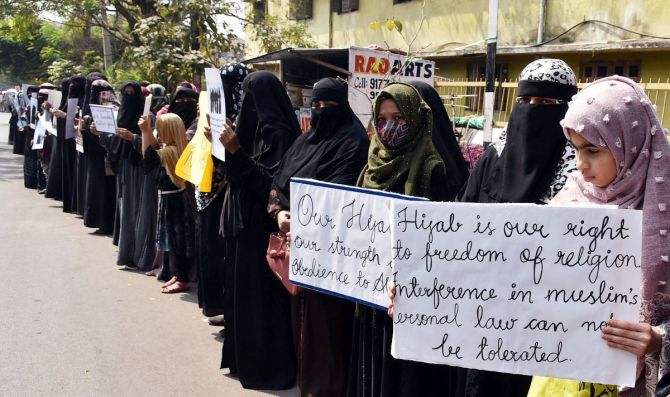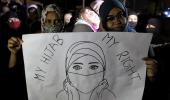A student cannot wear hijab to a secular school as a matter of right, Supreme Court judge Justice Hemant Gupta said on Thursday, insisting that they are required to follow the discipline of the school in the matter of uniform.

Justice Gupta rejected comparisons with students of Sikh faith carrying the kirpan, saying the essential religious practices of Sikhism cannot be made the basis for the believers of Islam to wear hijab.
A bench of Justices Hemant Gupta and Sudhanshu Dhulia delivered split verdicts on the Karnataka hijab ban row and referred the matter to the Chief Justice of India for constitution of an appropriate bench to consider the contentious issue.
In his 140-page judgment, Justice Gupta said, "The schools run by the State are open for admission irrespective of any religion, race, caste, language or any of them.
"Even the Act (Karnataka Education Act-1983) mandates that the students would be admitted without any restriction on such grounds. However, the students are required to follow the discipline of the school in the matter of uniform. They have no right to be in the school in violation of the mandate of the uniform prescribed under the statute and the rules".
He said the Karnataka government has not prevented the students from attending classes and, if they choose to stay away due to the issue over the uniform that has been prescribed, it is a voluntary act and the State cannot be accused of violating Article 29 (Protection of interests of minorities).
"It is not a denial of rights by the State but instead a voluntary act of the students. It would thus not amount to denial of the right to education if a student, by choice, does not attend the school. A student, thus, cannot claim the right to wear a headscarf to a secular school as a matter of right,” he said.
Justice Gupta was answering a question as to whether wearing hijab is an essential religious practice in Islam and a student can seek the right to wear it to a secular school.
He had framed 11 questions of law on the issue and answered them in the negative to arrive at a conclusion that all the appeals against the Karnataka high court verdict deserved to be dismissed.
To the question on what constitutes the ambit and scope of an essential religious practice under Article 25 of the Constitution, Justice Gupta said the practice of wearing hijab may be a ‘religious practice' or an ’essential religious practice' or it may be a social conduct for the women of Islamic faith.
"The interpretation by the believers of the faith about wearing of headscarf is the belief or faith of an individual. The religious belief cannot be carried to a secular school maintained out of State funds," he noted.
Justice Gupta said it is open to the students to carry their faith in a school which permits them to wear hijab or any other religious mark, maybe tilak, which can be identified with a person holding a particular religious belief but the State is within its jurisdiction to direct that the apparent symbols of religious belief cannot be carried to a school maintained by the State from the State funds.
"Thus, the practice of wearing hijab could be restricted by the State in terms of the government order,” he said, adding that equality before law is to treat all citizens equally, irrespective of caste, creed, sex or place of birth and such equality cannot be breached by the State on the basis of religious faith.
Responding to the comparison with Sikhism and students following the faith carrying the kirpan to educational institutions, the judge said, "It would not be proper to discuss the essential religious practices of the followers of the said faith without hearing them."
"The practices of each faith have to be examined on the basis of the tenets of that religion alone. The essential religious practices of the followers of Sikh faith cannot be made the basis of wearing of hijab/headscarf by the believers of Islamic faith," he said.
Justice Gupta said in the matters of campus discipline, the court does not substitute its own views in place of the school authority except in a case of manifest injustice or to interfere with a decision which does not pass the test of reasonableness.
He said the Karnataka government has not put any restriction on the exercise of the right conferred under Article 19(1)(a) but has regulated the same in a manner that during the school hours on working days and in the class the students shall wear the uniform as prescribed.











 © 2025
© 2025